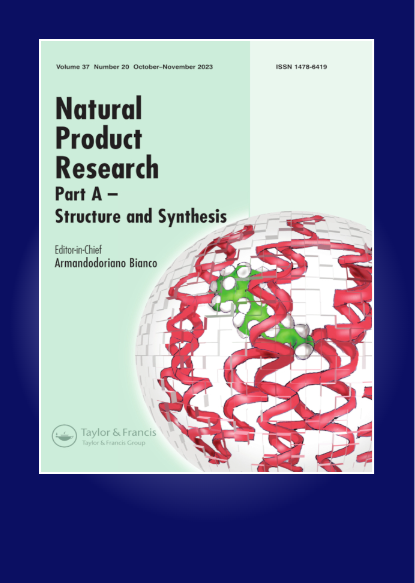Identification of potential antiviral compounds from Egyptian marine algae against influenza A virus
IF 1.9
3区 化学
Q3 CHEMISTRY, APPLIED
引用次数: 0
Abstract
Influenza is a contagious viral infection of the respiratory tract, affecting nearly 10% of the world’s population, each year. The aim of this study was to extract and identify antiviral compounds against the influenza-A virus (H1N1) from different species of Egyptian marine algae. Three samples of marine macroalgae species were extracted and the antiviral activity of the extracts were tested on Madin Darby Canine Kidney cells. The bioactive compounds present in the most active fractions were identified using gas chromatography-mass spectrometry (GC-MS), then the binding potentials of the identified compounds were examined towards neuraminidase (NA) of the influenza-A virus using molecular docking. The methanolic extract of Sargassum aquifolium showed promising in-vitro antiviral activity with a selectivity index (SI) value of 101. The GC-MS analysis showed twelve compounds and the molecular docking analysis found that tetradecanoic acid showed the strongest binding affinities towards the NA enzyme.
埃及海藻抗甲型流感病毒潜在抗病毒化合物的鉴定。
流感是一种呼吸道传染性病毒感染,每年影响全球近10%的人口。本研究的目的是从不同种类的埃及海藻中提取和鉴定抗甲型流感病毒(H1N1)的抗病毒化合物。本文对3种海洋巨藻进行了提取,并测定了其提取物对Madin Darby犬肾细胞的抗病毒活性。采用气相色谱-质谱联用(GC-MS)技术对活性组分中存在的生物活性化合物进行鉴定,然后利用分子对接技术检测鉴定的化合物与流感a- a病毒神经氨酸酶(NA)的结合势。马尾草甲醇提取物具有良好的体外抗病毒活性,其选择性指数为101。GC-MS分析发现了12个化合物,分子对接分析发现十四烷酸对NA酶的结合亲和力最强。
本文章由计算机程序翻译,如有差异,请以英文原文为准。
求助全文
约1分钟内获得全文
求助全文
来源期刊

Natural Product Research
化学-医药化学
CiteScore
5.10
自引率
9.10%
发文量
605
审稿时长
2.1 months
期刊介绍:
The aim of Natural Product Research is to publish important contributions in the field of natural product chemistry. The journal covers all aspects of research in the chemistry and biochemistry of naturally occurring compounds.
The communications include coverage of work on natural substances of land and sea and of plants, microbes and animals. Discussions of structure elucidation, synthesis and experimental biosynthesis of natural products as well as developments of methods in these areas are welcomed in the journal. Finally, research papers in fields on the chemistry-biology boundary, eg. fermentation chemistry, plant tissue culture investigations etc., are accepted into the journal.
Natural Product Research issues will be subtitled either ""Part A - Synthesis and Structure"" or ""Part B - Bioactive Natural Products"". for details on this , see the forthcoming articles section.
All manuscript submissions are subject to initial appraisal by the Editor, and, if found suitable for further consideration, to peer review by independent, anonymous expert referees. All peer review is single blind and submission is online via ScholarOne Manuscripts.
 求助内容:
求助内容: 应助结果提醒方式:
应助结果提醒方式:


